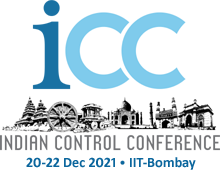There will be five plenary speakers at ICC-7, namely:
- Naga Pemmaraju, Mathworks India
- John Lygeros, ETH Zurich
- Balamuralidhar P, TCS Research
- Pramod P. Khargonekar, UC Irvine
- Sunita Sarawagi, IIT Bombay
Digital Transformation of the Industry: New Trends and Challenges
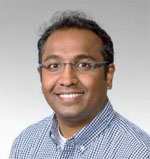
Naga Pemmaraju
Monday, December 20, 2021, 10:00-11:15, Room T1 (MoPAT1)
ABSTRACT: Engineers and scientists strive for “smart”: in the systems they develop, the discoveries they make, and the way they work and learn. While the value of “smart” is clear, it is not always apparent how to get there. To get to smart ,the Industry went through its digital transformation with the addition of electronic controls in virtually every system. With smart grids, automation and predictive maintenance, the industry is experiencing another digital transformation in which data-driven algorithms for implementing artificial intelligence are playing a key role.
In this presentation, you will learn how technologies like Model-Based Design and AI has helped the customers around the globe to address their challenges brought by digital transformation.
BIOGRAPHY: Mr. Naga Pemmaraju is a Principal Application Engineer with MathWorks India Pvt Ltd. specializing in the areas of modeling, simulation, controls and real-time simulations. He closely works with customers from across industries in helping them adopt model-based design approaches using MathWorks Products. He has over 14 years of experience working in controls for automotive, aero and renewable energy domains. Prior to joining MathWorks, Naga worked on controls for wind turbines at Vestas Wind System, on auto-code generation for converter controls at Northern Power Systems and on hardware-in-loop (HIL) simulations at Caterpillar Inc.
Naga holds a Bachelor degree in Electronics and Control Engineering from JNTU, Hyderabad, and Master’s degree in Electrical Engineering from Texas A & M University, Kingsville-USA.
Data enabled predictive control
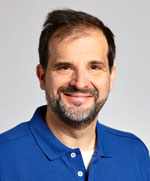
John Lygeros
Monday, December 20, 2021, 14:00-15:15, Plenary 2, Room T4 (MoPBT2.1)
ABSTRACT: Model predictive control (MPC) calls for repeatedly solving an optimisation problem on-line and applying the “opening moves” of the optimal decision to the system in receding horizon fashion. Though computationally demanding at first sight, with advances in embedded computation and optimisation, MPC has emerged as a powerful methodology for a range of applications, fast and slow. In many of these applications, however, obtaining a model of the system dynamics, the “M” in MPC, to include in the constraints of the optimisation problem can be challenging. The standard approach is to use data collected from the system in a two-step process of system identification to get an “M”, followed by conventional “PC”. Here we explore an alternative one-step approach, where the data is used directly in the constraints of the optimisation problem. We show that for deterministic linear systems this is equivalent to conventional MPC. The method is then extended to uncertain or nonlinear systems through regularisation; we discuss how this can be interpreted as robustifying the optimisation problem against uncertainty in the data. Finally, we demonstrate the applicability of the method through benchmark examples and problems in power systems.
BIOGRAPHY: John Lygeros received a B.Eng. degree in 1990 and an M.Sc. degree in 1991 from Imperial College, London, U.K. and a Ph.D. degree in 1996 at the University of California, Berkeley. After research appointments at M.I.T., U.C. Berkeley and SRI International, he joined the University of Cambridge in 2000 as a University Lecturer. Between March 2003 and July 2006 he was an Assistant Professor at the Department of Electrical and Computer Engineering, University of Patras, Greece. In July 2006 he joined the Automatic Control Laboratory at ETH Zurich where he is currently serving as the Professor for Computation and Control and the Head of the laboratory. His research interests include modelling, analysis, and control of large scale systems, with applications to biochemical networks, energy systems, transportation, and industrial processes. John Lygeros is a Fellow of the IEEE, and a member of the IET and the Technical Chamber of Greece. Since 2013 he is serving as the Vice-President Finances and a Council Member of the International Federation of Automatic Control and since 2020 as the Director of the National Center of Competence in Research “Dependable Ubiquitous Automation” (NCCR Automation).
Intelligent Autonomy and Cognitive Robotics
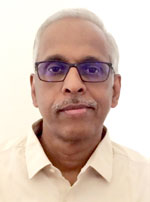
Balamuralidhar P
Tuesday, December 21, 2021, 14:00-15:15, Plenary 1, Room T6 (TuPAT1.1)
ABSTRACT: The area of Artificial Intelligent Systems is gaining a lot of attention and applications in various aspects of human life. The drive for automated systems has moved forward to autonomous systems and further to Intelligent autonomous systems. An advanced level of autonomy is needed to drive complex systems such as driverless vehicles, mobile robots, networked dynamic utility systems such as power, gas, water and transportation, supply chain, process control, industrial manufacturing systems, and space systems. Advancement of artificial intelligence has indeed caused performance levels of intelligent systems to leapfrog. Major AI aspects which contribute to system autonomy include the advancements in machine learning, computer vision and other perception technologies, natural language processing, navigation, manipulation, knowledge representation and processing, planning and control. Deep neural networks have dominant influence in many of the above areas, but they pose challenges in terms of data and computing resource requirements, transparency, explainability, trustworthiness etc. Some of the autonomous systems such as service robots are expected to work with humans, share the same operating space and to have long term autonomy. Cognitive robotics is an emerging area to address such challenges where the robots will have higher level cognitive functions that enable them to reason, gather conceptual understanding of the world, have the empathy needed to interact and know the states of self and other agents including human co-workers, and perform actions with the required levels of robustness and intelligence. In reality, achieving full autonomy for complex tasks is still not easy. In its place, multiple shades of autonomy from teleoperation to shared autonomy in the task composition will have to be incorporated to achieve the required performance levels and user experience.
In this talk some of the key technology trends in the above-mentioned areas will be reviewed along with a discussion on related research outcomes from TCS Research.
BIOGRAPHY: Dr. Balamuralidhar P is a Chief Scientist and Head, Robotics and Autonomous Systems Research Area, TCS Research, Bangalore. He has obtained a Bachelor of Technology from Kerala University, and Master of Technology from IIT Kanpur. His PhD is from Aalborg University, Denmark. His areas of current research include sensor informatics, computer vision, cognitive robotics, remote sensing and Space Tech.
Dr. Balamuralidhar has over 33 years of research and development experience, and has led several collaborative research initiatives. He has over 150 publications in various international journals and conferences, and over 60 patents granted. His previous research careers were with SAMEER Bombay, and Sasken Communications, Bangalore. He has co-authored a book titled “IoT-Technical Challenges and Solutions” published by Artech Book House.
Balamuralidhar received the TCS Distinguished Scientist award in 2020. He is also the recipient of two Tata Innovista awards and the Serial Innovator award from the Tata group. He has delivered several keynote addresses and invited talks at reputed conferences and symposiums. He is also a senior member of IEEE and a member of ACM.
Cognitive Cyber-Physical Systems: Vision and Ideas for Exploring a New Frontier
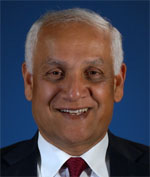
Pramod P. Khargonekar
Wednesday, December 22, 2021, 10:00-11:15, Plenary 1, Room T5 (WePAP1.1)
ABSTRACT: Cognitive cyber-physical system is a concept at the confluence of modern machine learning, neuro-cognitive sciences, and cyber-physical systems. The main goal of this talk is to present our vision for cognitive cyber-physical systems and discuss a research agenda that can realize them. We will begin with a brief historical view of cybernetics and explain how the concept of cognitive cyber-physical systems allows us to envision future cyber-physical systems integrated with machine learning and artificial intelligence. We will present key cognitive properties and how they might be realized in cognitive cyber-physical systems. We will present some of our preliminary work on this topic. The talk will conclude with a discussion of major research challenges for the future.
BIOGRAPHY: Pramod Khargonekar received B. Tech. Degree in electrical engineering in 1977 from the Indian Institute of Technology, Bombay, India, and M.S. degree in mathematics in 1980 and Ph.D. degree in electrical engineering in 1981 from the University of Florida, respectively. He has been on faculty at the University of Florida, University of Minnesota, The University of Michigan, and the University of California, Irvine. In March 2013 he was appointed by the National Science Foundation (NSF) to serve as Assistant Director for the Directorate of Engineering (ENG), a position he held till June 2016. In this position, Khargonekar led the ENG Directorate with an annual budget of more than $950 million. In June 2016, he assumed his current position as Vice Chancellor for Research and Distinguished Professor of Electrical Engineering and Computer Science at the University of California, Irvine.
Khargonekar’s research and teaching interests are centered on theory and applications of systems and control. His early work was on mathematical control theory, specifically focusing on robust control analysis and design. During the 1990’s, he was involved in a major multidisciplinary project on applications of control and estimation techniques to semiconductor manufacturing. His current research and teaching interests include systems and control theory, machine learning, and applications to smart electric grid and manufacturing. He is a Fellow of IEEE, IFAC, and AAAS. At the University of Michigan, he received the Claude Shannon Chair and Arthur F. Thurnau Professorship. In the past, he has served as Associate Editor for IEEE Transactions on Automatic Control, SIAM Journal of Control, Systems and Control Letters, and International J. of Robust and Nonlinear Control, and is currently on the Editorial Board of the Proceedings of IEEE. He has served on numerous committees in IEEE, IFAC, and AAAS. He is currently a member of: the Governance Board of Clean Energy Smart Manufacturing Innovation Institute (CESMII), Scientific Advisory Board of NSF ERC on Internet of Things for Precision Agriculture, and co-chair of the Applied Research Working Group of the University of California Global Climate Leadership Council (GCLC).
Robustness to Change in Machine Learning Models
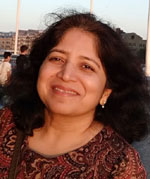
Sunita Sarawagi
Wednesday, December 22, 2021, 14:00-15:15, Plenary 2, Room T6 (WePBP2.1)
ABSTRACT: By default, machine learned models are trained for deployment on data distributions that match the training distribution. As machine learning gets entrenched in our way of life, our models need to embrace the inevitability of change. Change comes in many different forms. Some changes are certain and the changed value is predictable — for example, time of deployment. Surprisingly, even for such a predictable change current training objectives show suboptimal foresight. For other cases, the direction of change may be known during training, but the changed value is unknown. For handling temporal drift, we will discuss techniques such as continuous transportation of past data, kernel smoothed time-sensitive parameters, adversarial learning of time-invariant features, and special regularizers to control temporal complexity. For handling discrete shifts, we will discuss training strategies that view the training data as a mixture of groups to promote shared and generalizable features in various ways.
BIOGRAPHY: Sunita Sarawagi researches in the fields of databases and machine learning. She is institute chair professor at IIT Bombay. She got her PhD in databases from the University of California at Berkeley and a bachelor degree from IIT Kharagpur. She has also worked at Google Research (2014-2016), CMU (2004), and IBM Almaden Research Center (1996-1999). She was awarded the Infosys Prize in 2019 for Engineering and Computer Science, and the distinguished Alumnus award from IIT Kharagpur. She has several publications including best paper awards at ACM SIGMOD, VLDB, ICDM, NIPS, and ICML conferences. She has served on the board of directors of the ACM SIGKDD and VLDB foundation. She was program chair for the ACM SIGKDD 2008 conference, research track co-chair for the VLDB 2011 conference and has served as program committee member for SIGMOD, VLDB, SIGKDD, ICDE, and ICML conferences, and on the editorial boards of the ACM TODS and ACM TKDD journals.
TCS Research Cafe
Speakers: Supratim Ghosh and Harshad Khadilkar, TCS Research
Sessions: TuIAT7
Abstract: TCS Research Cafe is an informal interaction session targeted at students, but open to all. TCS researchers will give a short overview of the different research areas and research themes within TCS Research, and engage with the audience in an open interaction. Students can seek to know more about hiring procedures and what it is like to work at TCS Research.

